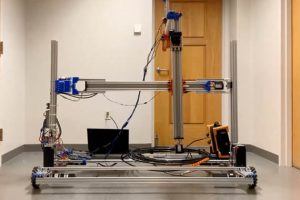
July 25, 2022
MAE Spring 2022 Capstone Projects
Seniors in the Department of Mechanical and Aerospace Engineering (MAE) at Mizzou conclude their coursework with a semester-long capstone project. Through these capstones, students apply their classroom learning to develop prototypes to solve real-world issues.

July 21, 2022
Important work: Slater enjoying internship at Vermeer Corporation
Andrew Slater, a senior in mechanical and aerospace engineering, is conducting an internship at Vermeer Corporation.

July 15, 2022
Career Services helps student stay connected to engineering over the summer
When the spring semester ended and he could not travel home to Ukraine, Vladyslav Sazhen needed a job and a way to stay connected to engineering. He reached out to Career Services to find a part-time position through which he could stay connected to the field he is studying and proudly proclaims is his passion.

July 14, 2022
Taking off: Toler internship at Boeing provides real-world experience
Landon Toler, a junior in mechanical and aerospace engineering, is working as a Quality Service Specialist at Boeing this summer.

July 12, 2022
Ma awarded patent for second generation Burnout coffee mug
A new coffee mug on the market instantly cools boiling liquids to the ideal drinking temperature, the second generation of the Burnout mug.

July 8, 2022
Landing a dream internship: Atchison spending summer at Textron Aviation
Lane Atchison, a mechanical and aerospace engineering major, has landed his dream internship working at Textron Aviation this summer.

June 28, 2022
Engineers develop robot to automatically inspect heat exchangers
A Mizzou Engineering team is designing a robot that can automatically inspect heat exchangers, which are critical to generating electricity.

June 9, 2022
Torq’N Tigers finish second at ASABE Quarter Scale Tractor Competition
Mizzou's Torq’N Tigers team earned second place honors at the ASABE International Quarter-Scale Tractor Student Design Competition

June 7, 2022
Spring 2022 Dean’s List now available
The College of Engineering has released the Spring 2022 Dean's List.

June 2, 2022
Heart of the matter: Oliver part of team devising new way to detect heart disease
PhD student Maggie Oliver is part of a team working on a novel way to detect heart disease. Heart disease remains the leading cause of death in the U.S., many times claiming its victims without warning. Maggie Oliver, a PhD student in mechanical engineering, hopes to help to change that. She’s working with Noah Manring, Dean of the College of Engineering and Ketcham Professor, and Dr. Senthil Kumar from University of Missouri Hospital on research that would make it easier to uncover signs of cardiovascular problems. For Oliver, the work is personal. “My grandma actually died of a…